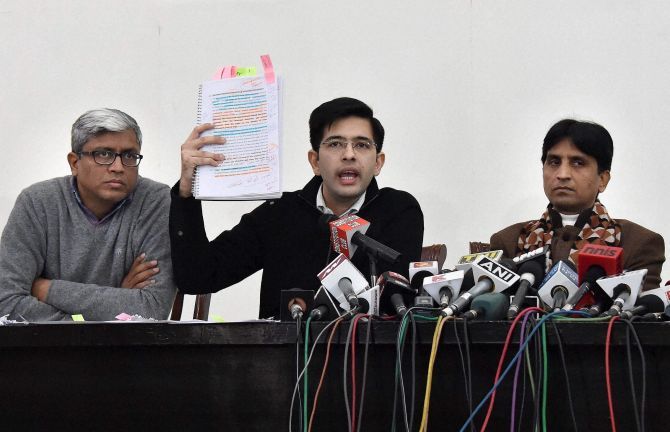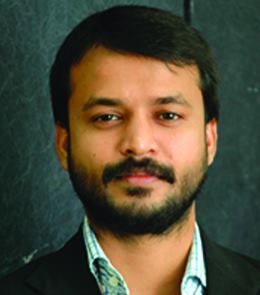Aam Aadmi Party spokespersons, Ashutosh, Ashish Khetan and Raghav Chadha, are adept at turning issues on their head and putting up a good offence in their defence, reports Manavi Kapur

On December 15, Delhi Chief Minister Arvind Kejriwal took to his favourite social media platform, Twitter, to express his anger over an alleged raid that the Central Bureau of Investigation had conducted at his principal secretary’s office. Giving twitteratti enough fodder to formulate witty repartees, he went on to call Prime Minister Narendra Modi a “psychopath”.
That night, debates on news channels were louder than usual, with Kejriwal’s principal secretary, Rajender Kumar, under fire for corruption charges and the Delhi chief minister for “unparliamentary” language. Matching anchors and panellists pitch for pitch, the Aam Aadmi Party’s battery of spokespersons -- Ashutosh, Ashish Khetan and Raghav Chadha -- deftly used benign smiles, caustic smirks and booming voices to drive their point home.
Two days later, at a press conference, where Chadha and Ashutosh were present, AAP alleged that CBI raided Kumar’s office in search of files on the Delhi & District Cricket Association “scam” in a last-ditch effort to prevent Finance Minister Arun Jaitley’s name from being sullied with allegations of corruption.
It took just a couple of days for AAP to outsmart debates, turn the spotlight away from it and put the focus on DDCA. As the Bharatiya Janata Party and Congress pointed this out, the DDCA angle of the debate only gained traction. A battle of perceptions was fought -- and partially won -- on TV debates by Kejriwal’s trusted men: Ashutosh, Khetan and Chadha.
Chadha looks like a student fresh out of college as we meet on the sixth floor of the Delhi Secretariat where Deputy Chief Minister Manish Sisodia also has his office. He welcomes me with a disarming smile, his deep maroon sweater adding the only colour to the sparse room. “Everyone has been accusing us of using the DDCA issue as a smokescreen. I, too, am intrigued, but by their timing,” he says. “The CBI chose to raid our office because we were about to formulate a commission of inquiry to look into the DDCA scam.”
The youngest spokesperson in AAP and, at 27, perhaps the youngest panellist on most TV debates, Chadha switches between composure and indignation with ease. True to his role as party spokesperson, our conversation stays within the gambit of the alleged DDCA scam.
When I ask him if it was a conscious decision to be aggressive on TV, he looks amused. “We have to put forward our view and it requires us to be emphatic without being loud -- cogent but not ferocious,” he says. He explains how the “nature of the game” is such that he needs to raise his voice, “sometimes”.
A resident of New Delhi’s New Rajinder Nagar, Chadha’s foray into politics happened with Anna Hazare’s Lokpal movement in 2012. He joined AAP for the “egalitarian, alternative politics” that it represents. “Politics is not considered a noble profession, thanks to some self-serving netas, which AAP wants to change. My family believes in the founding principles of AAP and is, thus, supportive of me,” he says.
His mother, a homemaker, is his strongest critic. “She does not like it when I raise my voice on television,” he laughs.
A chartered accountant by training, Chadha explains how his involvement in politics has meant a financial sacrifice, though one that has been “worth it”, with his financial acumen helping AAP decode documents. An anchor of a popular news channel agrees that Chadha is always prepared with facts and is not easy to confuse. “Besides, feedback suggests he is quite popular among female viewers,” he says.
Ravish Kumar, senior executive editor at NDTV India, explains how Chadha has used a seeming disadvantage to his favour. “Other panellists try to treat him like a child, but Chadha is a true politician who uses logic to counter arguments,” he says. “But he also sometimes gets stuck among the big guns, which is when he uses his age to his advantage, playing the card of an inexperienced politician very well.”

If Chadha brings financial acumen to the AAP table, Ashutosh and Khetan use their experience as journalists to turn tables on the opposition. One floor above where I meet Chadha, Khetan meets me in his spacious office, looking diminutive and even an anomaly in the bureaucratic setting. Dressed in a navy flannel shirt, he greets me with a polite, though guarded, smile. Known for his investigative reports, he is now the vice-chairperson of the Delhi government’s think tank, Delhi Dialogue Commission, and enjoys the perks of a Cabinet minister.
His transition to politics, he says, was “organic”. “I often changed jobs in search of more editorial independence. I took on the holy cows of public life as a journalist and politics is an extension of that,” he says. Sipping on a cup of green tea, he exudes a sense of calm not always seen in him during television debates. “If people treat us like punching bags, we are naturally going to fight back,” he says.
The father of three daughters, Khetan agrees that politics has taken a toll on his family. “While they are supportive of what I do, they don’t always understand why I do it.”
AAP has often used attack as its defence, which is where “diversionary” methods come into the picture. Former AAP member and Supreme Court advocate Prashant Bhushan says this is a common spokesperson strategy.
“When cornered, you shout, blame other parties or divert attention by introducing something sensational into the debate. These are all Arvind’s [Kejriwal] strategies and his spokespersons are following in his footsteps.”
Bhushan cites the example of the debate on the Lokpal Bill issue when he challenged Kejriwal to publicly discuss the amendments in the Bill. “When they saw they couldn’t win the debate, they introduced the odd-even car rule to completely distract the citizens of Delhi,” he says.
On a news debate, Bhushan called Chadha “inexperienced” and ill-equipped to debate the Lokpal issue. The shouting match ended in an awkward silence, which is when the anchor chose to break for an advertisement. “They believe they can say anything confidently and it will be taken as the truth. This has been a gradual change, especially in Chadha,” says Bhushan.
When I request Ashutosh for a meeting, he refuses, saying that he finds it “very odd” to talk about himself. The next morning, a belligerent Ashutosh is seen waving sheaves of paper, offering “proof” that Jaitley is complicit in the DDCA “scam”. I am reminded of his days as a television anchor, especially in the way he modulates his voice and enunciates certain words.
I am also reminded of an appearance he made on TV after Gajendra Singh, a farmer, allegedly committed suicide during an AAP rally. Ashutosh had then burst into tears -- the public emotional breakdown became the subject of endless jokes on social media. This streak continues in his latest book, The Crown Prince, the Gladiator and the Hope, where he sings paeans in honour of Kejriwal.
“He [Ashutosh] continues his on-screen aggression in politics, too, though with greater professionalism,” says Kumar. He believes that Ashutosh, much like Khetan, has learnt how to demolish any opposing view with practised aggression. “But Chadha is the real politician among the three,” says Kumar, offering a cricket analogy for the three AAP spokespersons.
“While Ashutosh is a pacer, who stuns the more experienced politicians with a bouncer they didn’t see coming, Khetan is the fielder and Chadha the wicketkeeper,” he laughs.
Ashutosh, says another news anchor, is more rhetorical and theatrical during debates, offering broad strokes as compared to the fine-print that Chadha goes into or the passionate ideology that Khetan presents. “They all understand the news cycle and know how to use it to manage perception, almost turning it into an art form,” he says. “Look at how they spun the issue of mass leave by Indian Administrative Service officers, suggesting that they are all corrupt, without saying so.”
“AAP has no past,” says Kumar, “and it charges on without worrying about counter attacks” -- or skeletons spilling out of its cupboard. It also plays up its image as the permanent “underdog” -- the “victim” under attack from all quarters. “But we are the underdog -- a tiny government that a lot of people want to fail,” defends Khetan.
Unfazed by the jokes aimed at them, Chadha says the only people whose views matter are the people of Delhi. “When I present an argument on TV, I am speaking directly to the people,” he says. “The other panellists or a provocative anchor is not our focus.”











